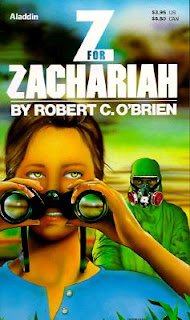O'Brien Read/Watch: Z for Zachariah Book vs Film
Welcome to the second half of my look at the film adaptation of Z for Zachariah. This time, I'm going to look at the differences between the book and the film and talk about how those differences affect the story.
I knew going into the film that there were going to be differences -- primarily that there was a third character introduced into the main conflict, giving the film a love triangle of sorts. This is, quite possibly, the largest departure from the story in the book. I say possibly because I think there is something that better qualifies -- but more on that momentarily.
The addition of Caleb (everyone has Biblical names here; even Ann is derived from Hannah) actually could have served to emphasize the book's themes very well. His appearance would have been a major concern to the paranoid John from the book, and the potential romantic tension between Ann and Caleb would definitely have rankled the possessive and outright predatory man O'Brien depicts in his novel. By contrast, the film never really explores any of this potential conflict. It flirts with conflict, makes eyes at potential messes the characters might make of their life together -- and then ignores that to . . . move on to more flirtatious not-conflict?
Movie!John is at times more nuanced than his book counterpart. Rather than a attempted rapist and known murderer, the film tries to paint him as a man who is hard on his luck, who has lost his own family, who (though flawed) cares about Ann and wants their relationship (such as it is) to move forward properly. But then he has moments that seem incongruous with this intention, where subtle hints of the manipulative, overpowering man of the book slip through. The film's biggest misstep was not being willing to make John a hero or a villain; some stories may call for moral ambiguity, but Z for Zachariah is not one of them.
Which brings me to the film's biggest departure: Ann. The film's opening sequences with Ann convinced me I was going to see the Ann of the book brought to life by Margot Robbie. She was innocent but capable. She understood a great deal about the world she lived in, but acknowledged the gaps in that knowledge. I was surprised to see that the film emphasized her religious views, because the book was very clear that (although she prayed at the church) she had no strong views. This change actually emphasized the book's themes rather well, in my opinion, but unfortunately it came couple with something that absolutely killed Ann's character from the book: she had no backbone. In the book, Ann determines to live in the cave as long as she can, eventually tricking John into abandoning his precious biohazard suit long enough for her to steal it so she can leave the valley. In the film, she repeatedly waves away his apologies and his harmful actions and words and never really takes up for herself with any gusto (unless it's to protest her feelings for John). In the end, she accepts John's story that Caleb has left the valley and resigns herself to living with John.
This ending -- or lack of one, really -- was what sat worst with me as I watched. There is no climax, no resolution to what little tension the plot has carried this far (and they tout this as a thriller!). The movie simply ends, and when everything is left unstated, nothing is said. Part of the ending's issue stems from a fundamental change early in the film: Ann has left the valley before, in her own piecemeal radiation suit, to bring back books. This is something that John uses to keep her controlled in the book, denying her access to his own high-tech suit for something as "frivolous" as books. John's suit in the movie is "beat up" and rather than a symbol of life and possibilities becomes merely another tool in a decaying world.
Not all of the changes from the book worked against the movie. Having Ann's brother David be killed by John was a good idea that brought the conflict closer to home -- at least, it should have. John did not hide this fact from Ann long enough or hard enough to make it as effective a revelation as it should have been. Especially given the shot of John using the rifle's scope to spot Ann by the store. That should have been a moment of foreshadowing to the book's more proper climax where Ann and John are caught in a game of cat and mouse. Even the introduction of Caleb should not have derailed this moment.
In short, the 2015 film of Z for Zachariah never quite grasps the themes and messages of its source material. While its beginning shows promise, its middle suffers from a lack of direction and the ending suffers from a lack of existence. If you're especially curious about the film and have an hour and forty minutes to kill, there's probably still a better way to spend that time (like reading the book).
At least Secret of NIMH didn't blindside you with a lack of resolution.
I knew going into the film that there were going to be differences -- primarily that there was a third character introduced into the main conflict, giving the film a love triangle of sorts. This is, quite possibly, the largest departure from the story in the book. I say possibly because I think there is something that better qualifies -- but more on that momentarily.
The addition of Caleb (everyone has Biblical names here; even Ann is derived from Hannah) actually could have served to emphasize the book's themes very well. His appearance would have been a major concern to the paranoid John from the book, and the potential romantic tension between Ann and Caleb would definitely have rankled the possessive and outright predatory man O'Brien depicts in his novel. By contrast, the film never really explores any of this potential conflict. It flirts with conflict, makes eyes at potential messes the characters might make of their life together -- and then ignores that to . . . move on to more flirtatious not-conflict?
Movie!John is at times more nuanced than his book counterpart. Rather than a attempted rapist and known murderer, the film tries to paint him as a man who is hard on his luck, who has lost his own family, who (though flawed) cares about Ann and wants their relationship (such as it is) to move forward properly. But then he has moments that seem incongruous with this intention, where subtle hints of the manipulative, overpowering man of the book slip through. The film's biggest misstep was not being willing to make John a hero or a villain; some stories may call for moral ambiguity, but Z for Zachariah is not one of them.
Which brings me to the film's biggest departure: Ann. The film's opening sequences with Ann convinced me I was going to see the Ann of the book brought to life by Margot Robbie. She was innocent but capable. She understood a great deal about the world she lived in, but acknowledged the gaps in that knowledge. I was surprised to see that the film emphasized her religious views, because the book was very clear that (although she prayed at the church) she had no strong views. This change actually emphasized the book's themes rather well, in my opinion, but unfortunately it came couple with something that absolutely killed Ann's character from the book: she had no backbone. In the book, Ann determines to live in the cave as long as she can, eventually tricking John into abandoning his precious biohazard suit long enough for her to steal it so she can leave the valley. In the film, she repeatedly waves away his apologies and his harmful actions and words and never really takes up for herself with any gusto (unless it's to protest her feelings for John). In the end, she accepts John's story that Caleb has left the valley and resigns herself to living with John.
This ending -- or lack of one, really -- was what sat worst with me as I watched. There is no climax, no resolution to what little tension the plot has carried this far (and they tout this as a thriller!). The movie simply ends, and when everything is left unstated, nothing is said. Part of the ending's issue stems from a fundamental change early in the film: Ann has left the valley before, in her own piecemeal radiation suit, to bring back books. This is something that John uses to keep her controlled in the book, denying her access to his own high-tech suit for something as "frivolous" as books. John's suit in the movie is "beat up" and rather than a symbol of life and possibilities becomes merely another tool in a decaying world.
Not all of the changes from the book worked against the movie. Having Ann's brother David be killed by John was a good idea that brought the conflict closer to home -- at least, it should have. John did not hide this fact from Ann long enough or hard enough to make it as effective a revelation as it should have been. Especially given the shot of John using the rifle's scope to spot Ann by the store. That should have been a moment of foreshadowing to the book's more proper climax where Ann and John are caught in a game of cat and mouse. Even the introduction of Caleb should not have derailed this moment.
In short, the 2015 film of Z for Zachariah never quite grasps the themes and messages of its source material. While its beginning shows promise, its middle suffers from a lack of direction and the ending suffers from a lack of existence. If you're especially curious about the film and have an hour and forty minutes to kill, there's probably still a better way to spend that time (like reading the book).
At least Secret of NIMH didn't blindside you with a lack of resolution.




Comments
Post a Comment
What do you think?